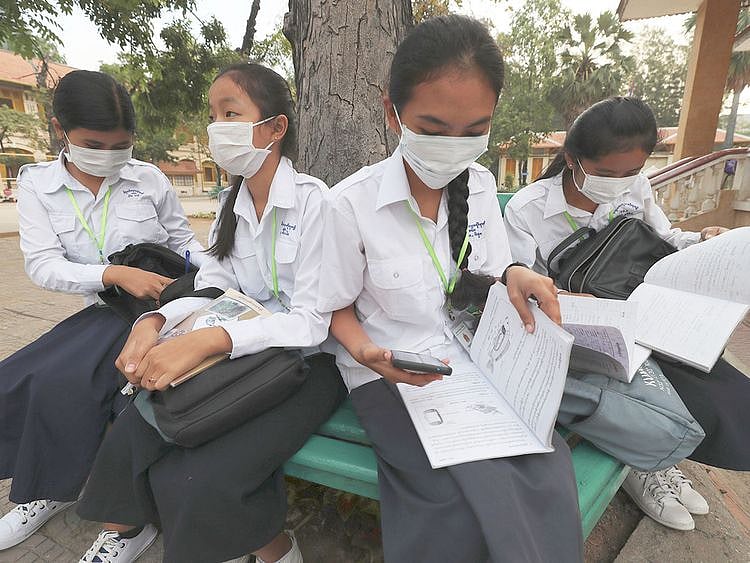People have become polarised over something other than politics. We’re now divided into those who are washing our hands more carefully and more often, but otherwise living as usual, and those who are buying a year’s supply of toilet paper and, at the extreme end, ordering $400 bottles of now-rare Purell.
For every Covid-19 headline urging “don’t panic,” there’s another saying this epidemic is “unstoppable” or “out of control” and that we are “unprepared.” Uncertainty is still high enough that facts can be used to support either argument.
People just want clear, simple numbers on the likely spread of Covid-19, when it’s likely to peak, and the odds that it will be fatal. But there’s no consensus.
WHO assistant director general Bruce Aylward says the number of cases may be lower than thought but death rates could turn out to be, as suspected, over 1%. This is based on extensive investigations of the situation in China.
Harvard doctor Jeremy Samuel Faust uses data from the ill-fated cruise ship Diamond Princess to make the opposite case — arguing that once we get a handle on the extent of mild cases, doctors may find the death rate much lower.
What we do know is that some people are in more real danger — people over 80, people with compromised immune systems and those with certain pre-existing respiratory conditions are at a much higher risk of death. As for the rest of us, there’s less risk but plenty of guilt. We don’t want to spread the disease by doing the wrong thing.
New information
New information is coming in all the time. A paper published in Science examines the effect of travel bans and suggests they had only a small effect on slowing the spread of the virus out of China.
The researcher suggest that going forward, the more important action will be to educate people about hand washing and avoiding big public gatherings. And people should prepare to stay home for two weeks if identified as likely to be exposed — which shouldn’t require that much toilet paper.
This divide between the scared and not-scared is forming natural filter bubbles. If you’re going about your normal business, you probably see there are still plenty of avocados in the supermarket. People are still going to their yoga classes and taking off on various weekend adventures. Most people on the street are not wearing masks.
We in the non-scared bubble are seeing a self-selected sample of others like us and are cut off from the anxious, since they are spending more time either glued to their television sets or frequenting the aisles where Purell and N95 masks are sold (or were sold, until they sold out).
The Boston Globe this week examined life inside the fearful bubble, describing how anxiety about the virus is making “us” crazy — “us” being those who are stocking up on dry goods and otherwise not living life as usual.
We’re being told to remain calm, but the US Federal Reserve is cutting its benchmark interest rate in an emergency move and authorities are disinfecting stations every four hours. But all the guidance feels so vague.
Anxiety disorders
Edicts such as “don’t panic” don’t help. It’s never good to panic and it’s not clear what constitutes panic in this case. Postponing your trip to Italy? Working from home until further notice? Cancelling large public gatherings?
The American Physical Society cancelled its massive annual March meeting in Colorado, a big sacrifice considering that many had paid for the travel, spent weeks preparing talks, and a few had already arrived. But that was considered prudent. Smaller gatherings at churches in Japan and Singapore have generated clusters of disease.
The problem is there’s too much emotion and too little fact in media coverage, says Emmanuel Maidenberg, a psychologist at UCLA who studies, among other things, anxiety disorders.
Each new death makes for an onslaught of breathless headlines. And yet progress has been incremental in answering the questions people really want answered: How big will this get? How dangerous is it? How scared should I be?
The fear itself is a problem, he says. It could be limiting life for some people, promoting unnecessary social isolation, or overwhelming the health care system.
Medical paranoia
The US health care system, for instance, is built on encouraging some degree of medical paranoia. Under ordinary circumstances we’re told that even if we feel fine we need all sorts of tests. And so it’s natural that people will demand tests for Covid-19.
So far, testing has been limited to those who are extremely ill or for select people helping scientists track the spread of disease. Harvard epidemiologist Mark Lipsitch has been warning that laboratories and hospitals could be “overwhelmed” if tests become available on demand.
There are rational things to do to prepare, and businesses must plan ahead and take seriously the need to ensure sick employees can stay home without financial hardship. Preparing without panicking takes a special kind of mind; someone who can hold two opposing ideas at the same time and continue to function.
As for the expensive Purell, don’t worry if you can’t buy it. Proper soap and water washing will do the job, and if you need to sanitise your hands at times when there’s no sink, you can always make your own hand sanitiser.
Bloomberg
Faye Flam is a columnist. She has previously written for the Economist, the New York Times, the Washington Post and other publications.
Network Links
GN StoreDownload our app
© Al Nisr Publishing LLC 2026. All rights reserved.
